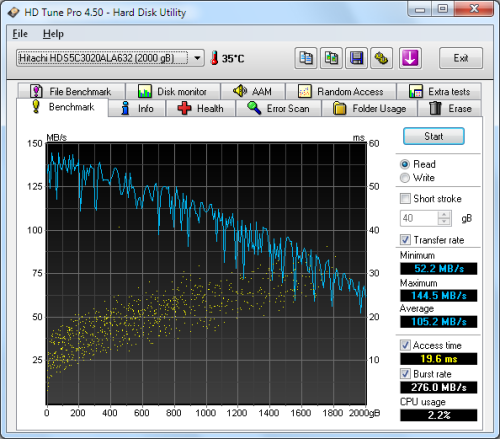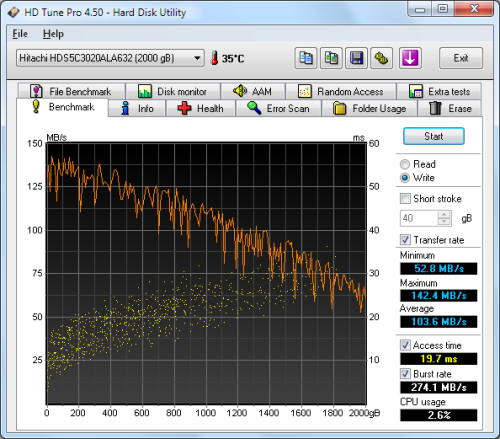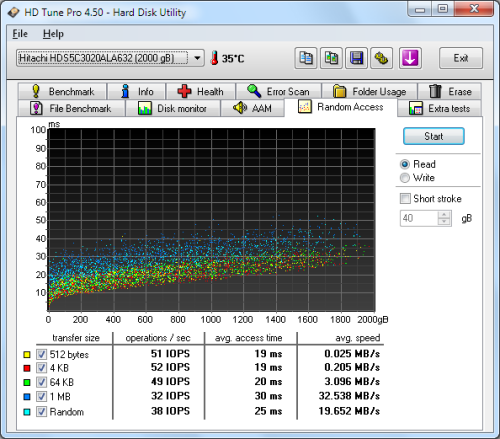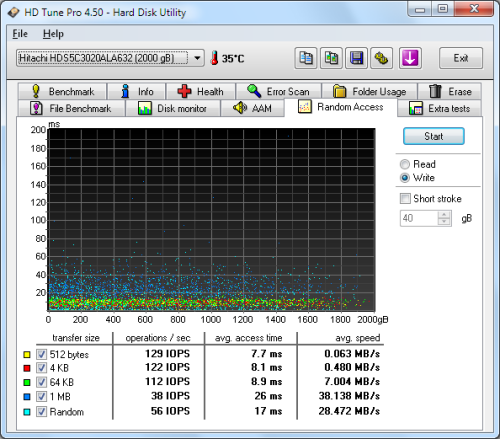The test system used in this review was an HP dc7900. The computer came equipped with an Intel Core 2 Duo E8400 3.0GHz CPU, 2GB of DDR2 800MHz memory, Seagate Barracuda 7200.10 ST3250310AS 250GB SATA hard drive, NVIDIA Quadro FX570 256MB PCIe graphics card, Intel 82567LM-3 gigabit network card and HighPoint Rocket 620 SATA 6Gb/s controller. For the operating system, I installed a fresh copy of Windows 7 Enterprise.
To test the performance of the Hitachi Deskstar 5K3000, I ran a series of benchmarks using CrystalDiskMark 3.0, HD Tach RW 3.0.4.0, ATTO Disk Benchmark 2.46 and HD Tune Pro 4.50.
CrystalDiskMark 3.0:
First, I ran a few quick tests using CrystalDiskMark. This benchmark tool measures the performance of a storage device by testing its sequential read and write speeds as well as its random read and write speeds using blocks 512K and 4K in size.
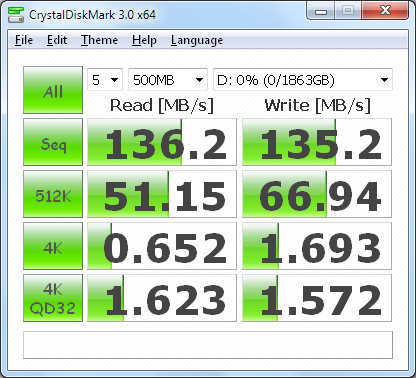
Hitachi doesn't really say what kind of speeds the Deskstar 5K3000 is capable of. Using CrystalDiskMark we can see that the drive is able to read at 136 MB/s and write at 135 MB/s.
HD Tach RW 3.0.4.0:
Next, I used HD Tach to test the Hitachi Deskstar 5K3000's read, write and burst speeds as well as its seek times and CPU usage.
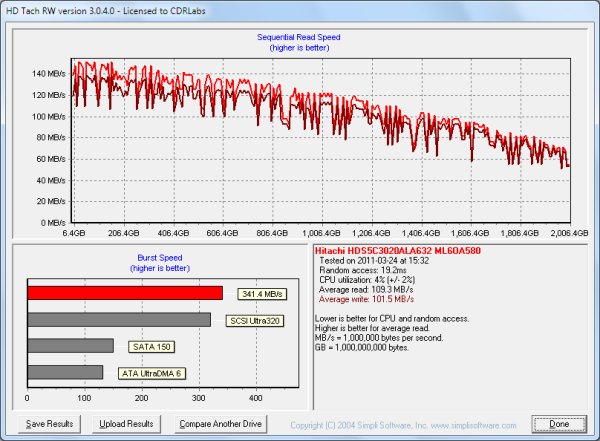
The Deskstar 5K3000 performed very well when tested with HD Tach. Looking at the screenshot above, you can see that the drive had average read and write speeds of 109.3 MB/s and 101.5 MB/s, respectively, as well as a burst speed of 341.4 MB/s.
ATTO Disk Benchmark 2.46:
I also used ATTO Disk Benchmark to test the Hitachi Deskstar 5K3000's sequential read and write speeds. The test was run using blocks ranging in size from 0.5KB to 8192KB and the total length set to 256MB.
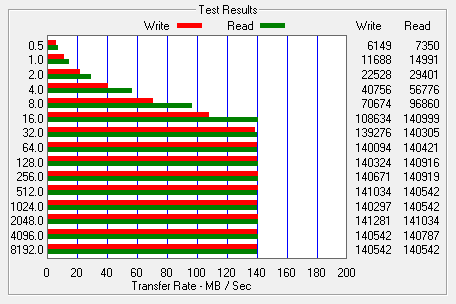
When tested with ATTO, the Deskstar 5K3000's read and write speeds topped out at about 141 MB/s.
HD Tune Pro 4.50:
Next, I ran a series of tests using HD Tune Pro. This hard disk utility measures a drive's performance by testing its sequential read and write speeds as well as its access time, burst rate and CPU usage. For this review, I used it to benchmark the Hitachi Deskstar 5K3000's random read and write speeds, random access times and the number of operations per second.
The performance here was very similar to what we saw with HD Tach. The Deskstar 5K3000 had average read and write speeds of 105.2 MB/s and 103.6 MB/s, respectively, and a burst rate of about 275 MB/s. The drive's access times were a little high. However, this is primarily due to its slower rotational speed.
While no match for the SSDs we've looked at recently, the Deskstar 5K3000's random read and write performance is on par with other low-power hard drives.
Final Thoughts:
The Hitachi Deskstar 5K3000 is an excellent choice for anyone looking to add a low-power, high capacity hard drive to their HTPC, home server or desktop computer. Thanks to technologies like HiVERT and CoolSpin, the 5K3000 uses less power and is quieter than drives with a 7,200 RPM rotational speed. Of course, as with any low power hard drive, there is some trade off in regards to performance. The 5K3000's slower rotational speed did have a negative impact on its access times. However, the drive still performed surprisingly well in our tests, reading and writing at speeds in excess of 135MB/s.
The Hitachi Deskstar 5K3000 is available now in 1.5TB, 2TB and 3TB capacities. The 2TB version reviewed here currently runs about $80. However, it can often be found for as little as $70 through Newegg and Amazon. Expect to pay a premium for the 3TB version of the drive though, which can be purchased from Amazon or through some of the vendors on PriceGrabber for about $150.
Highs:
- Available in 1.5TB, 2TB and 3TB capacities
- SATA 6Gb/s interface
- Good read and write speeds
- Power efficient
- Quiet operation
- 32MB cache
- Affordably priced
- 3 year warranty
Lows:
- High access times


